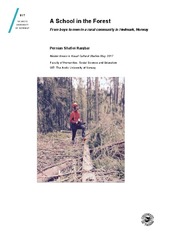| dc.description.abstract | Why do young rural men chose to stay in their home county in district Norway in order to become forest workers? This thesis is a case study among 35 boys from the age 16 to 19, under education to become forestry workers at a forestry school nearby Finnskogen in Hedmark, Norway. The study was conducted through fieldwork at the vocational school, the school dormitory and the local forestry community, from May to July 2015. By studying livelihood and the social dynamics among boys and men living in a forestry community in a Norwegian district, this thesis seeks to explore the motives behind choosing a rural life and the way boys and men make rural life meaningful through male identity constructions.
By exploring socialization aspects within a forestry school and exploring concrete social situations and relations, such as relations with fellow students and teachers, events, and feedback from their environment I try to find out what produces the sense of identity as men, a sense of community, and a sense of difference from main Norwegian society.
Young rural men are frequently presented as “the new losers of today’s society” (Bye, 2010). The media discourse on rural men present those who are not leaving home as marginalized failures, because of what is considered to be their lack of opportunities to have an urban and modern lifestyle (Bye, 2010). Researchers that have studied district culture and its representation in Norway, have argued that young rural men living in the districts are highly stigmatized in Norway (Krange & Skogen, 2003). The thesis adds value by challenging the established idea of young rural men as passive actors who have little say in choosing their own destiny. By contrast, I found that many of my formants actively choose life in the rural community based on childhood dreams, prosperity and realization of the good life, and do not merely navigate their lives based on lack of opportunities.
This thesis is situated in visual cultural studies, rural and gender studies. The project builds on a qualitative study of a forestry community situated around a forestry school in eastern Norway. The data are collected through video observation, participant observation, and interviews conducted over three months among rural boys and men living in the area. | en_US |


 English
English norsk
norsk


